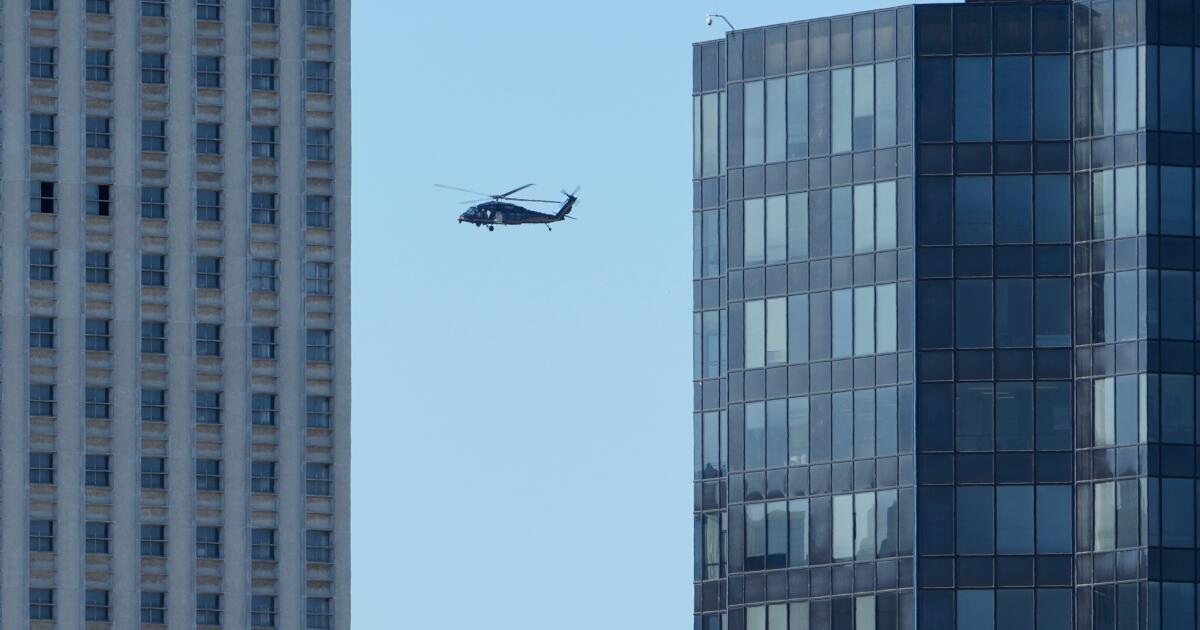MEMPHIS, Tenn. — National Guard troops were seen patrolling in Memphis for the first time on Friday, as part of President Trump’s federal task force, which faces multiple legal challenges.
At least nine National Guard troops began their patrol at the Bass Pro Shops located at the Pyramid, an iconic landmark in Memphis. They were being escorted by a Memphis police officer and posed for photos with visitors who were standing outside.
It was unclear how many Guard members were on the ground or were expected to arrive later.
During an NAACP Memphis forum on Wednesday, Memphis Police Chief Cerelyn “CJ” Davis said she hoped Guard personnel would help direct traffic and have a presence in “retail corridors,” but not be used to operate checkpoints or anything similar.
“From a public safety standpoint, we’re trying to utilize Guard personnel in non-enforcement types of capacities, so it does not feel like there is this over-militarization in our communities, in our neighborhoods, and that’s not where we’re directing those resources, either,” she said.
Memphis Mayor Paul Young, a Democrat, said he never requested that the Guard come to Memphis. But after Trump made the Sept. 15 announcement and Republican Gov. Bill Lee agreed, Young and other officials said they wanted the task force to focus on targeting violent offenders rather than use their presence to scare, harass or intimidate the general public.
For years, Memphis has dealt with high violent crime, including assaults, carjackings and homicides. While this year’s statistics show improvement in several categories, including murders, many acknowledge that violence remains a problem.
Federal officials say hundreds of arrests and more than 2,800 traffic citations have been made since the task force began operating in Memphis on Sept. 29. Arrest categories include active warrants, drugs, firearms and sex offenses, according to the U.S. Marshals Service. Four arrests have been made on homicide charges, the Marshals Service said.
An ongoing legal battle
Friday’s development comes day after a federal judge in Illinois blocked the deployment of troops in the Chicago area for at least two weeks.
The on-again, off-again deployments stem from a political and legal battle over President Donald Trump’s push to send the National Guard to several U.S. cities. His administration claims crime is rampant in those cities, despite statistics not always backing that up.
If a president invokes the Insurrection Act, they can dispatch active duty military in states that fail to put down an insurrection or defy federal law, but the judge in Chicago said Thursday she found no substantial evidence that a “danger of rebellion” is brewing in Illinois during Trump’s immigration crackdown.
The ruling offered a victory for Democratic officials who lead the state and city.
“The court confirmed what we all know: There is no credible evidence of a rebellion in the state of Illinois. And no place for the National Guard in the streets of American cities like Chicago,” Gov. JB Pritzker said.
The order in Illinois is set to expire Oct. 23 at 11:59 p.m. U.S. District Judge April Perry set an Oct. 22 hearing to determine if it should be extended for another 14 days.
In her ruling, she said the administration violated the 10th Amendment, which grants certain powers to states, and the 14th Amendment, which assures due process and equal protection.
It wasn’t clear what the 500 Guard members from Texas and Illinois would do next. They were mostly stationed at a U.S. Army Reserve Center in Elwood, southwest of Chicago. A small number on Thursday were outside a U.S. Immigration and Customs Enforcement building in Broadview, which for weeks has been home to occasional clashes between protesters and federal agents.
Officials at U.S. Northern Command directed questions to the Department of Defense, which cited its policy of not commenting on ongoing litigation. The troops are under the U.S. Northern Command and had been activated for 60 days.
U.S. Justice Department lawyer Eric Hamilton said Thursday that the Guard’s mission would be to protect federal properties and government law enforcers in the field, not “solving all of crime in Chicago.”
The city and state have called the deployments unnecessary and illegal.
Deployment in Portland remains on hold
A federal appeals court heard arguments on Thursday over whether Trump had the authority to take control of 200 Oregon National Guard troops. The president had planned to deploy them in Portland, where there have been mostly small nightly protests outside an ICE building.
A judge last Sunday granted a temporary restraining order blocking the move. Trump had mobilized California troops for Portland just hours after the judge first blocked him from using Oregon’s Guard.
Two dozen other states with a Democratic attorney general or governor signed a court filing in support of the legal challenge by California and Oregon. Twenty others, led by Iowa, backed the Trump administration.
The president previously sent troops to Los Angeles and Washington.
In a California case, a judge in September said the deployment was illegal. By that point, just 300 of the thousands of troops sent there remained and the judge did not order them to leave.
Sainz writes for the Associated Press. AP writers Ed White in Detroit, Geoff Mulvihill in Philadelphia, Adrian Sainz in Memphis, Tenn., and Konstantin Toropin in Washington contributed to this report.
